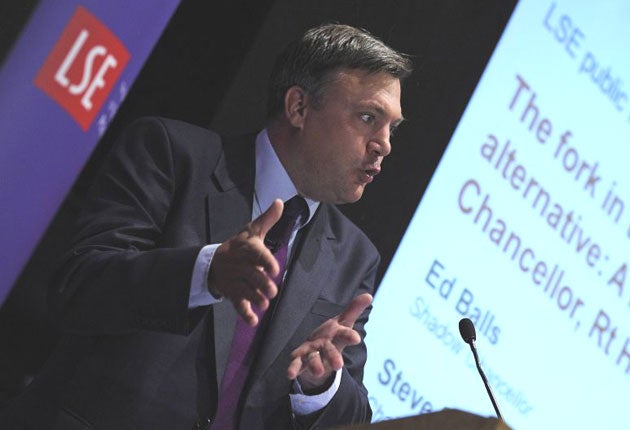Osborne must cut VAT until the economy recovers, says Ed Balls
Shadow Chancellor insists a return to 17.5 per cent rate for a year would help consumers and push down inflation

Ed Balls called yesterday for an emergency temporary cut in VAT to jump-start Britain's "flatlining" economy and ease the pain caused by the Government's tough deficit-reduction strategy.
In his first major speech since becoming shadow Chancellor in January, Mr Balls refused to bow to pressure from some Labour colleagues, who want him to admit more openly that the party made mistakes on the economy during its 13 years in power.
Although he dismissed claims that Labour overspent as "fiction", he acknowledged that – like all governments – it had not spent every penny wisely. Asked for examples, he came up with the "destabilising and wasteful" shake-up of primary care trusts from 2003 to 2007.
The shadow Chancellor argued that VAT should be reduced until the economy starts to grow strongly again. He said the move would put more money into people's pockets, help consumers feeling the squeeze from rising prices and rising taxes, push down inflation, and help the struggling retail sector.
VAT was raised from 17.5 per cent to 20 per cent in January. Pressed later about the cost of his plan, Mr Balls said returning to the 17.5 per cent rate for one year would cost the Treasury about £13bn. He argued: "The question is not the cost to George Osborne of paying for this temporary emergency tax cut, but the price our country will pay if he carries on regardless," he said in his speech.
Mr Balls's case was bolstered by official figures yesterday showing high-street sales fell by 1.4 per cent last month, as supermarkets, electrical retailers and DIY stores were hit heavily by the spending squeeze. The downturn was blamed on rising prices, fuel increases and falling levels of real pay.
Food sales fell by more than 3 per cent over the past year – the worst monthly performance since 2008.
In a lecture at the London School of Economics, Mr Balls accused the Chancellor, George Osborne, of putting politics before economics, and gambling by cutting spending "too far, too fast" ahead of the 2015 election. He was convinced that the plan to eradicate the structural deficit in this Parliament "was primarily about electoral politics – rapid tax rises and spending cuts chiefly designed to fit a political timetable that gets the pain over early [and] makes Labour take the blame".
He admitted he was still relatively isolated in his view that the financial markets would tolerate a less aggressive approach to the deficit and said it was too early to say whether he or the Chancellor would be proved right.
But Mr Balls was astonished that Mr Osborne had not thought more carefully about the "fork in the road" when he came to office last year. He said: "He did not hesitate in making a rash and headlong lunge down the path of rapid deficit reduction."
The shadow Chancellor declared: "The risk is that George Osborne will wreak long-term, as well as short-term, damage on the British economy by creating a vicious circle of permanently lower business investment, lower income and lower employment, which in turn requires bigger tax increases and deeper spending cuts to get the deficit down.
"There is an alternative. It is more credible than the current plan, not less, and it is not too late to change course. But George Osborne must put the national interest first and stop trying to score cheap political points by blaming Labour for all his problems."
Mr Balls compared Britain to Portugal, which raised VAT twice, and countries such as Greece and Ireland which faced turmoil despite spending cuts and tax rises.
The Conservatives and Liberal Democrats were quick to attack the Balls plan. Michael Fallon, the Tories' deputy chairman, said: "Ed Balls's Plan B of increased spending and a £51bn unfunded tax cut at a time when we have a similar deficit to Greece and Portugal looks like a plan for bankruptcy."
Nick Clegg, the Deputy Prime Minister, told Westminster journalists: "The Labour Party is now perilously close to terminally and permanently losing the confidence of the British people on the economy."
Join our commenting forum
Join thought-provoking conversations, follow other Independent readers and see their replies
Comments
Bookmark popover
Removed from bookmarks